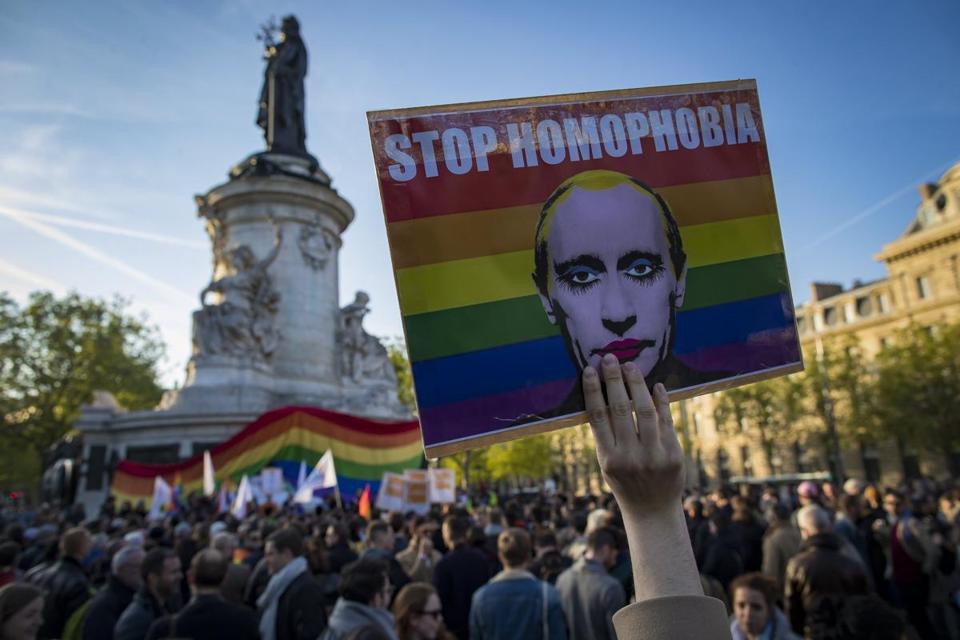A brutal campaign against LGBT people has been sweeping through Chechnya, a conservative Muslim republic in Russia.
The Campaign
Head of the Chechen Republic Ramzan Kadyrov has ordered law enforcement and security agent officials to abduct dozens of men on the suspicion that they are gay. It is reported that some of the men have disappeared being tortured and humiliated.
This information was first published by leading independent Russian paper Novaya Gazeta on 1 April, though it was initially dismissed as an ‘April Fools’ Joke’.
Kadyrov’s press secretary described the report as ‘absolute lies and disinformation’ stating that there were no gay people in the Chechen region.
“If there were such people in Chechnya, law-enforcement agencies wouldn’t need to have anything to do with them because their relatives would send them somewhere from which there is no returning”.
People in Chechnya are afraid to speak to human rights monitors or journalists (anonymously or not) due to the climate of fear and being intimidated into silence.
The authorities are not the only issue for members of the LGBT community in Chechnya. Homosexuality is so taboo that family members are expected to perform ‘honour killings’ of gay relatives.
To get away from the fear that has taken over the region, a secret shelter in Moscow has seen at least 30 people arrive since the outbreak of the information.
There have also been reports of the captured men being taken to the ‘Argun Detention Centre’ – with many people referring to it as a gay concentration camp. Although reports of a concentration camp may not be accurate, humans rights groups claim that the Chechen situation is the worst abuse of LGBT people in years.
Deputy Executive Director at Outright International, Maria Sjodin told NBC news that there has never been anything on this scale, “we’ve heard of attacks from both state and non-state actors around the world happening on a fairly frequent basis, but based on the information that’s available – this is set apart.”
The World’s Response
Since the brutal campaign has come into light over the past month protests have been held outside Russian embassies worldwide, including in London. Despite this, the international community has been accused of being slow to react.
Gay men not persecuted in Chechnya: Russia https://t.co/9ouVoLkPOM pic.twitter.com/muLy5gcdj1
— Sky News Australia (@SkyNewsAust) April 25, 2017
Not only has the sweep been condemned by Western governments as well as the United Nations and rights groups. Activists in Russia have set up an underground network to spirit the victims out of Chechnya and to protect them from potentially violent situations.
“Gays in Chechnya and the North Caucasus are in lethal danger,” Igor Kochetkov, director of the Russian LGBT Network, said in a telephone interview.
“People whose partners are detained have every reason to believe they will be arrested. It is very hard not to name the names under torture.”
Last week, Foreign Minister Julie Bishop said Australia was “concerned at reports of mass arrests of individuals in Chechnya in the Russian Federation due to their perceived or actual sexual orientation.”
On Saturday, Canada chimed in on the discussion, calling on Russia to ‘immediately ensure the safety of all persons in Chechnya.’
The United States has placed pressure on Russia to condemn the reported attacks as Ambassador to the United Nations, Nikki Haley, urged authorities to intervene in the human rights abuses in Chechnya.
“We continue to be disturbed by reports of kidnapping, torture, murder of people in Chechnya based on their sexual orientation and those persecuted by association.”
Rights Around the World
It is suggested that Australia is lagging behind the rest of the world when it comes to the campaign for same-sex marriage as counties with similar cultural backgrounds having now legalised same-sex marriage. Yet, based on total country numbers Australia joins the majority in restricting marriage to couples of just a man and woman.
Out of 209 countries only 23 allow same-sex couples to marry, the ABC identified.
There are certain places in the world where LGBT people struggle to simply stay out of gaol as there are more than 70 countries where homosexual acts are illegal.
Many of the countries identified in the below map fall within two main categories – with just over half being former colonies mostly in Africa that inherited discriminatory laws but never repealed them, while the others are majority-Muslim countries.
The death penalty is in place for same-sex sexual acts in at least eleven countries worldwide – Sudan, Iran, Saudi Arabia and Yemen and in parts of Nigeria and Somalia. The death penalty could also be imposed in Mauritania, Afghanistan, Pakistan, Qatar and the United Arab Emirates through Sharia Law.




